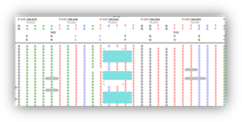Next Generation Sequencing
- Cystic Fibrosis (CFTR)

BACKGROUND:
Cystic fibrosis (CF) is an autosomal recessive disorder generally characterized by chronic obstructive lung disease, pancreatic insufficiency, poor gastrointestinal tract absorption and elevated sweat electrolytes. Other manifestations of CF have now been recognized to include male infertility caused by bilateral absence of the vas deferens, recurrent nasal polyps, rectal prolapse and chronic bronchiectasis. The incidence of CF varies widely among different ethnic and racial groups, (from 1:3300 live births in those of Northern European descent, 1:6400 for Southern European groups, 1:8500 for American Hispanics, 1:17,000 for African-Americans, to being extremely rare in Asian populations).
Recommendations by an independent Consensus Panel convened by the NIH on genetic testing for CF (released on April 16, 1997) are the following:
- Offer testing for common gene mutations that cause CF as an option to all pregnant couples and those planning pregnancy. (Although more than 1200 CF mutations have been identified, the vast majority are rare, so expanding the panel of screened mutation beyond the common mutations referred to above is expected to achieve only marginal gains in sensitivity.)
- Offer testing to individuals with a family history of disease and partners of people with CF.
- Insurance should cover the procedure in all of these populations.
INDICATIONS FOR TESTING:
- All pregnant couples and couples planning pregnancy.
- Confirmation of a clinical diagnosis of CF.
- Carrier testing for those with a family history of CF.
- Prenatal testing for known carrier couples.
- Carrier screening in the Ashkenazi Jewish population.
- Prenatal testing where ultrasound indicates echogenic bowel, obstructed bowel or fetal meconium ileus.
- Diagnosis for individuals with bilateral absence of the vas deferens.
SAMPLE REQUIREMENTS: |
| Blood: 3-5 ml purple top (EDTA) vacutainer of whole blood inverted several times to mix. Forward within 48 hours at room temperature. |
| Amniotic Fluid: 10-15 ml amniotic fluid from 14th-17th week of gestation or one confluent T25 flask of cultured cells. Send specimen refrigerated, but not frozen (do not ship on dry ice). Please use an overnight courier service. |
| Test Method: Next Generation Sequencing of all coding regions of CFTR gene |
| Turn around time: 5-7 days |
| Report: will include assay results, background information, and a calculation of residual carrier risk if results are negative |
INTERPRETATION:
| Residual Risk Comparison | Carrier Risk Before Testing | RUTGERS NJMS CFTR Sequencing Residual Risk | 60 Mutation Residual Risk | 23 Mutation Residual Risk |
| Ashkenazi Jewish | 1 in 24 | 1/2301 | 1/455 | 1/380 |
| Non-Hispanic Caucasian | 1 in 25 | 1/1201 | 1/312 | 1/200 |
| Hispanic White | 1 in 58 | 1/2851 | 1/263 | 1/200 |
| African American | 1 in 61 | 1/3001 | 1/270 | 1/170 |
| Asian American | 1 in 94 | 1/4651 | 1/208 | 1/180 |
| Detection Rates are based on mutation frequencies in patients affected with Cystic Fibrosis. Detection rates may vary in patients with CFTR related conditions. Detection rates for mixed or unknown ethnicity cannot be determined. All interpretation assumes that the individual is clinically unaffected and has no family history of Cystic Fibrosis. | ||||
COUNSELING ISSUES:
- The absence of a detectible CF mutation does not exclude a diagnosis of CF or CF carrier status. Over 600 CF mutations have been discovered, the vast majority being rare and seen only in individual families. The following table depicts the frequency of detectible mutations in various population groups as well as the overall carrier frequency in these groups.
- For family/carrier testing, it is most helpful to analyze an affected individual or their obligate carrier parents as a prelude to testing other at-risk members within the family.
- When mutations are not detected by direct DNA testing, linkage analysis may be a useful alternative for that family. Consultation with the laboratory director may be helpful.
- Genetic counseling is indicated to help individuals understand the implications of both positive and negative test results or in situations where the clinical diagnosis is uncertain or atypical.

 Institute of Genomic Medicine
Institute of Genomic Medicine